Are you exhausted from paying high energy bills due to inefficient heating and cooling? We have the solution for you!
In our Ultimate Guide, we’ll show you how to boost the efficiency of your heat pump HVAC system. From understanding the components to proper maintenance techniques, we’ll share all the tips and tricks you need.
Get ready to save money and maximize comfort with our expert advice. Let’s dive in and revolutionize your home’s energy efficiency!
Key Takeaways
- Heat pumps transfer heat from the outside air, ground, or water source and provide heating and cooling functions.
- Energy efficiency in heat pump HVACs reduces cost, environmental impact, and increases the lifespan of the system.
- Efficiency in heat pump HVACs leads to lower energy bills, extended lifespan, increased home value, and minimized wear and tear.
- Improved energy efficiency in heat pump HVACs reduces the carbon footprint, greenhouse gas emissions, and strain on the environment, contributing to a healthier planet.
Understanding Heat Pump HVAC Systems
We frequently use heat pump HVAC systems to efficiently regulate the temperature in our homes. These systems are designed to transfer heat from one area to another, using a small amount of energy.

Heat pumps work by extracting heat from the outside air, ground, or water source and transferring it into our homes during the colder months. During the summer, they reverse the process and remove heat from the indoor air, releasing it outside. This heat transfer process allows heat pumps to provide both heating and cooling functions, making them highly versatile.
Compared to traditional heating and cooling systems, heat pumps have lower energy consumption because they don’t generate heat but instead move it around. This not only helps reduce energy costs but also minimizes environmental impact.
The Importance of Energy Efficiency in Heat Pump HVACs
When it comes to heat pump HVAC systems, energy efficiency plays a crucial role in both cost savings and environmental impact.
By maximizing efficiency, homeowners and businesses can significantly reduce their energy bills and operational costs.

Additionally, energy-efficient heat pump HVACs consume less electricity, resulting in decreased greenhouse gas emissions and a smaller carbon footprint.
Cost-Saving Benefits of Efficiency
By regularly maintaining and optimizing the energy efficiency of our heat pump HVACs, we can significantly reduce operating costs and save money in the long run. Here are three cost-saving benefits of efficiency:
Lower energy bills: An energy-efficient heat pump HVAC system consumes less electricity, resulting in reduced energy bills. By minimizing energy wastage and maximizing performance, you can save a significant amount of money on your monthly utility bills.
Extended lifespan: Regular maintenance and optimization of your heat pump HVAC system can help prolong its lifespan. By ensuring that your system operates at peak efficiency, you can minimize wear and tear, reducing the need for costly repairs and replacements.
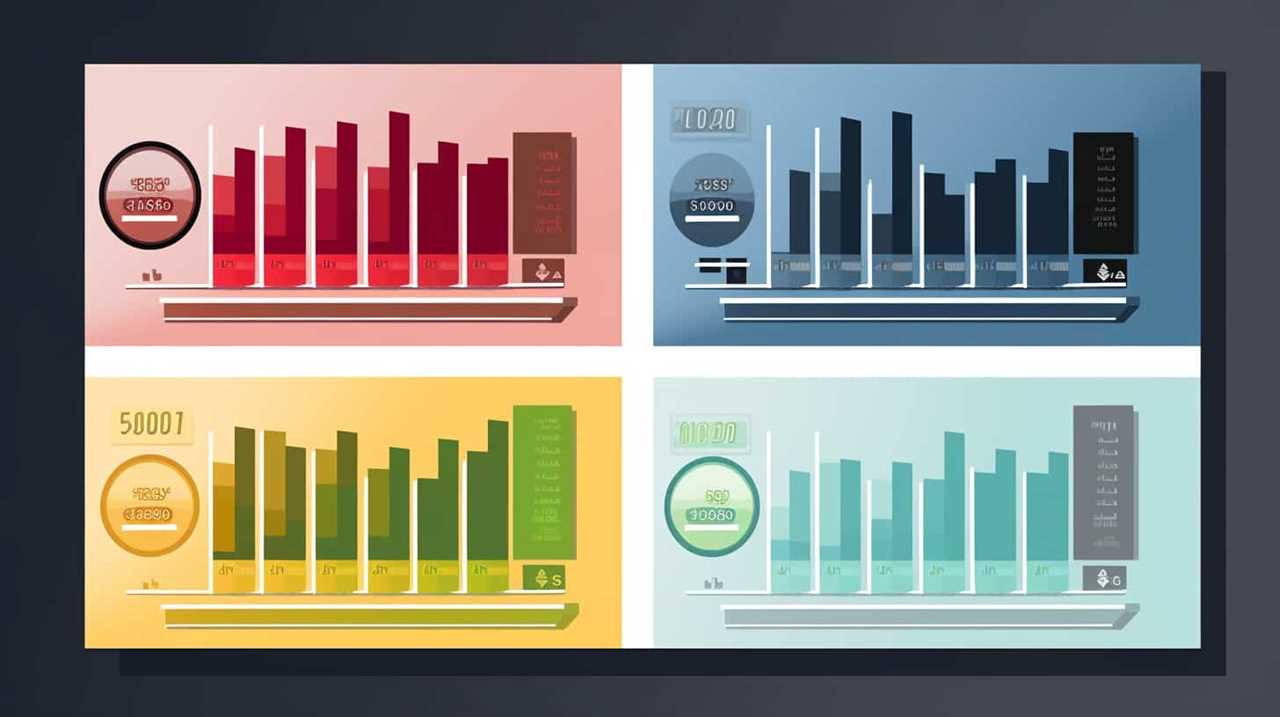
Increased home value: Energy-efficient HVAC systems are highly desirable among potential homebuyers. By investing in an efficient heat pump HVAC system, you not only save money in the long run but also increase the value of your home, making it more attractive to prospective buyers.
Environmental Impact of Efficiency
Improving the energy efficiency of heat pump HVACs has a significant environmental impact. By reducing the energy consumption of these systems, we can effectively lower their carbon footprint and contribute to sustainable practices.
Heat pump HVACs that operate with high efficiency consume less electricity, resulting in reduced greenhouse gas emissions and less strain on the environment. This is particularly important considering that heating and cooling systems account for a significant portion of energy usage in residential and commercial buildings.
Key Components of Energy Efficient Heat Pump HVAC Systems
To achieve optimal energy efficiency, we must carefully consider the key components of our heat pump HVAC systems. These components play a crucial role in the performance optimization and energy efficient design of these systems.

Here are three key components that are essential for maximizing the efficiency of heat pump HVAC systems:
Compressor: The compressor is the heart of the heat pump system. It’s responsible for compressing the refrigerant and increasing its temperature and pressure. Choosing a high-efficiency compressor can significantly improve the system’s performance and reduce energy consumption.
Coil Design: The design of the evaporator and condenser coils is critical for efficient heat transfer. A well-designed coil maximizes heat exchange between the refrigerant and the air, enhancing the system’s overall efficiency.
Smart Controls: Incorporating smart controls into the heat pump HVAC system allows for precise temperature and humidity control. These controls optimize the operation of the system, adjusting settings based on occupancy, outdoor conditions, and other factors to minimize energy wastage.

Tips for Proper Maintenance of Heat Pump HVAC Systems
Our heat pump HVAC systems require regular maintenance to ensure optimal performance and efficiency. Maximizing the performance of these systems is crucial for maintaining a comfortable indoor environment while minimizing energy consumption. To achieve this, proper maintenance is essential.
Here are some troubleshooting tips to help you maintain your heat pump HVAC system effectively.
Firstly, make sure to clean or replace the air filters regularly. Clogged or dirty filters restrict airflow, reducing the system’s efficiency.
Secondly, inspect the outdoor unit for any debris or obstructions. Clear away leaves, dirt, or any other objects that might hinder airflow.

Additionally, check the refrigerant levels and ensure they’re within the recommended range. Low refrigerant levels can lead to decreased performance and potential damage to the system.
Lastly, schedule regular professional maintenance to detect and address any potential issues before they escalate.
Optimizing Heat Pump HVAC Efficiency Through Insulation
When it comes to optimizing the efficiency of heat pump HVAC systems, proper insulation techniques play a crucial role. The choice of insulation materials can greatly impact the overall performance and energy efficiency of the system.
Proper Insulation Techniques
We can significantly enhance the efficiency of our heat pump HVAC systems by properly insulating our homes. Proper insulation techniques not only help to maintain a comfortable indoor temperature but also reduce energy consumption and lower utility bills.

Here are three important factors to consider when it comes to insulating materials and installation methods:
Insulating materials: Using high-quality insulating materials such as fiberglass, cellulose, or spray foam can effectively reduce heat transfer between the indoor and outdoor environments. These materials have excellent thermal resistance properties and can be installed in walls, roofs, and floors to prevent heat loss or gain.
Installation methods: It’s crucial to ensure that insulation is properly installed to maximize its effectiveness. Proper sealing of gaps, cracks, and air leaks is essential to prevent heat leakage. Additionally, insulation should be installed evenly and without any compression to maintain its thermal resistance.
Vapor barriers: In regions with high humidity levels, the inclusion of vapor barriers is important to prevent moisture buildup within the insulation. Vapor barriers help to keep the insulation dry and maintain its thermal performance over time.

Impact of Insulation Materials
Using the right insulation materials and techniques can significantly improve the efficiency of heat pump HVAC systems. Insulation materials with low thermal conductivity are key in minimizing heat loss or gain through the walls, floors, and ceilings of a building. The thermal conductivity of a material refers to its ability to conduct heat. Materials with low thermal conductivity, such as fiberglass, mineral wool, and foam board, are commonly used in HVAC insulation. These materials create a barrier that reduces heat transfer, helping to maintain a stable indoor temperature and reducing the workload on the heat pump. By choosing insulation materials with low thermal conductivity, HVAC systems can operate more efficiently, resulting in lower energy consumption and cost savings for homeowners.
| Insulation Material | Thermal Conductivity (W/mK) |
|---|---|
| Fiberglass | 0.034 |
| Mineral Wool | 0.037 |
| Foam Board | 0.024 |
| Spray Foam | 0.020 |
| Cellulose | 0.038 |
Energy Savings Potential
Insulating heat pump HVAC systems can provide significant energy savings potential by optimizing their efficiency. Here are three ways insulation can help in achieving energy savings:
Reduced Heat Loss: Proper insulation of the heat pump HVAC system minimizes heat loss, ensuring that the heated or cooled air stays inside the building. This reduces the workload on the heat pump, resulting in lower energy consumption.
Improved Temperature Control: Insulation helps maintain a consistent indoor temperature by preventing heat transfer through walls, floors, and ceilings. This means the heat pump won’t need to work as hard to maintain the desired temperature, leading to energy savings.
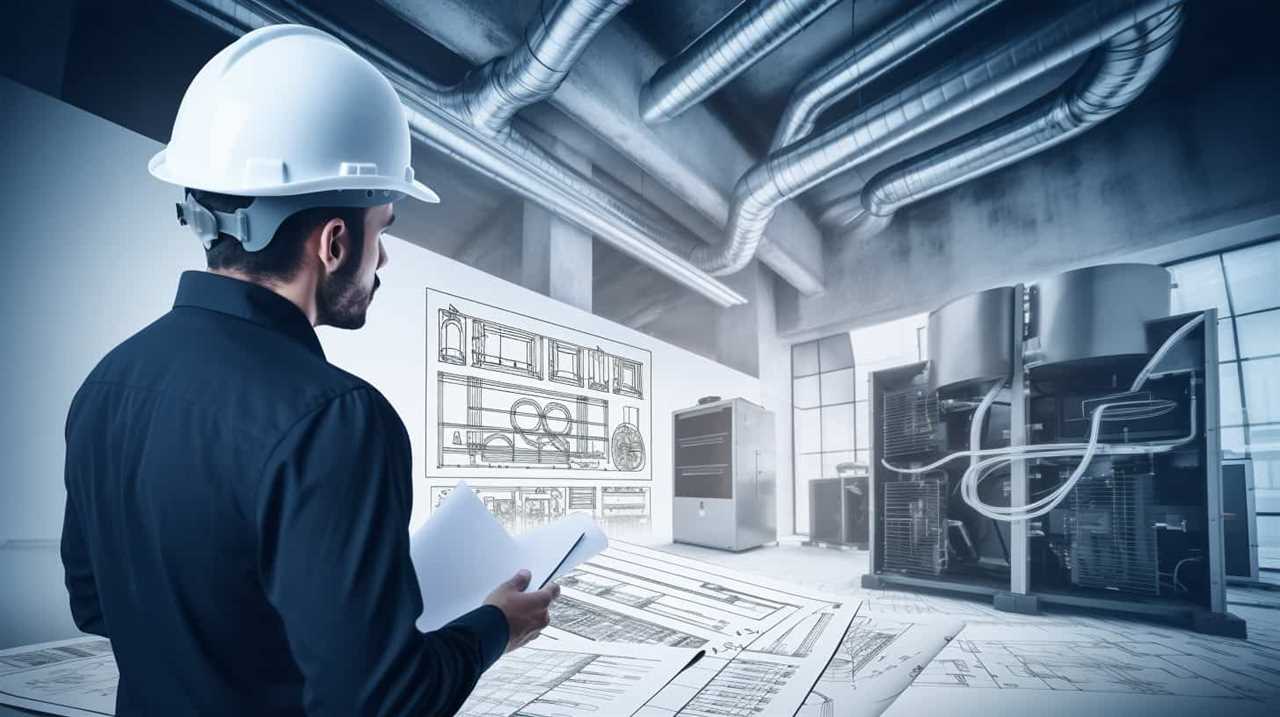
Enhanced Efficiency of Programmable Thermostats: Insulation ensures that the conditioned air stays inside the building, allowing programmable thermostats to work more effectively. By optimizing temperature settings based on occupancy and scheduling, energy consumption can be further reduced.
To identify areas for insulation improvement, consider conducting an energy audit, which will provide insights into the efficiency of the heat pump HVAC system and help prioritize insulation upgrades.
Exploring Smart Thermostat Options for Heat Pump HVACs
When exploring options for smart thermostats in heat pump HVAC systems, it’s important to consider their compatibility and features.
Smart thermostats offer a range of features that can optimize the performance and efficiency of heat pump HVACs. One important feature to look for is compatibility with different HVAC systems, as not all smart thermostats are designed to work with heat pump systems. It’s crucial to choose a smart thermostat that’s specifically designed for heat pumps to ensure optimal performance.

Additionally, smart thermostats can offer features such as energy usage monitoring, remote control access, and learning capabilities. These features allow homeowners to track and adjust their energy consumption, control their HVAC system from anywhere, and even learn their temperature preferences over time.
Energy Saving Techniques for Heat Pump HVAC Systems
By properly maintaining and regularly servicing our heat pump HVAC systems, we can significantly increase their energy efficiency. Here are three energy-saving techniques to optimize heat pump performance:
Set temperature wisely: Adjusting the thermostat by just a few degrees can save a significant amount of energy. Lower the temperature during winter and raise it during summer to reduce the workload on the heat pump.
Use programmable thermostats: These devices allow you to schedule temperature changes based on your daily routine. By automatically adjusting the temperature when you’re not at home or asleep, you can avoid unnecessary energy consumption.
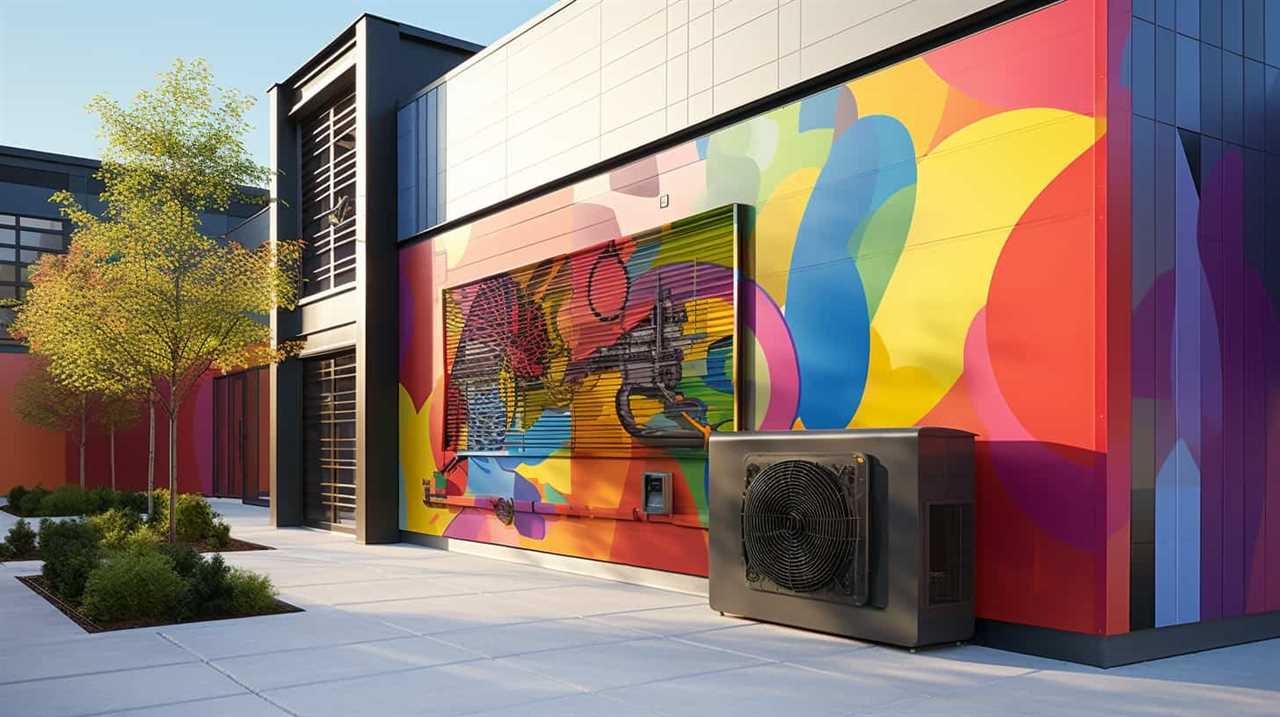
Improve insulation: Proper insulation ensures that the heat pump can efficiently warm or cool your space. Insulate your walls, ceilings, and floors to minimize heat loss or gain, reducing the workload on the heat pump and saving energy.
Maximizing Heat Pump HVAC Efficiency With Proper Sizing
We can maximize the efficiency of our heat pump HVAC system by ensuring proper sizing. Proper installation is crucial for achieving optimal performance and reducing energy consumption.
When the heat pump HVAC system isn’t properly sized, it can lead to inefficiencies and increased energy usage. An undersized system will struggle to meet the heating or cooling demand, resulting in longer run times and higher energy consumption. On the other hand, an oversized system may cycle on and off frequently, wasting energy and reducing overall efficiency.
Therefore, it’s essential to consult with a professional HVAC technician to determine the appropriate size for your heat pump HVAC system based on factors such as the size of the space, insulation levels, and climate conditions. By ensuring proper sizing, you can maximize the efficiency of your heat pump HVAC system and reduce energy consumption.

The Future of Energy Efficient Heat Pump HVAC Technology
Our industry experts predict that a significant increase in energy efficient heat pump HVAC technology will revolutionize the way we cool and heat our spaces. The future advancements in this field hold great promise for reducing energy consumption and achieving greater efficiency.
Here are three key areas where we expect to see significant developments:
Enhanced system controls: Future heat pump HVAC systems will feature advanced control algorithms that optimize the operation of the system based on real-time conditions. This will result in improved energy efficiency and more precise temperature control.
Integration with renewable energy sources: As the demand for renewable energy continues to grow, heat pump HVAC systems will increasingly integrate with solar panels, wind turbines, and other clean energy sources. This will further reduce energy consumption and dependency on fossil fuels.
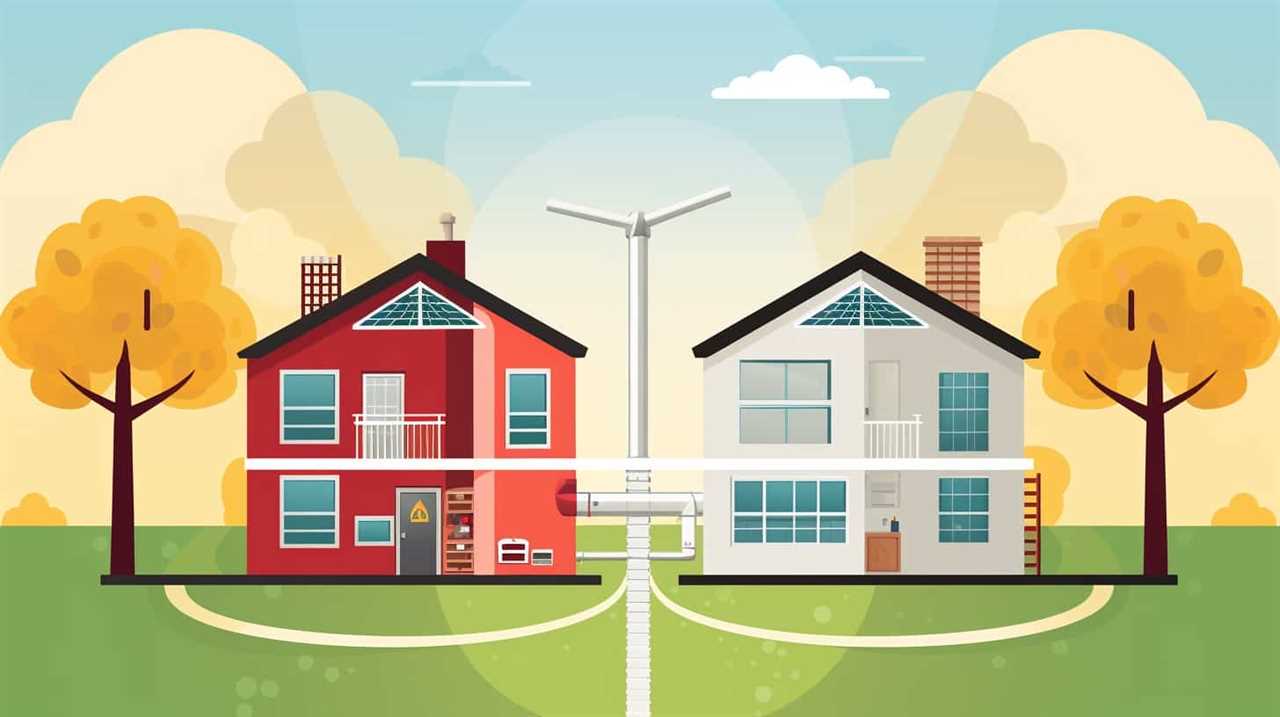
Smart grid connectivity: Heat pump HVAC systems of the future will be equipped with smart grid connectivity, allowing them to communicate and interact with the power grid. This will enable advanced load management strategies, such as demand response and time-of-use pricing, to further enhance energy efficiency and optimize electricity consumption.
These future advancements in energy efficient heat pump HVAC technology hold tremendous potential for reducing energy consumption and creating a more sustainable and comfortable indoor environment.
Frequently Asked Questions
How Do Heat Pump HVAC Systems Compare to Traditional HVAC Systems in Terms of Energy Efficiency?
Heat pump HVAC systems are more energy-efficient compared to traditional systems. They consume less energy, resulting in cost savings and reduced environmental impact. Additionally, their performance is superior due to their ability to transfer heat rather than generate it.
Can I Install a Heat Pump HVAC System in My Home if I Live in a Cold Climate?
Yes, we can install a heat pump HVAC system in our home even if we live in a cold climate. The benefits of a heat pump in cold weather include efficient heating and cost savings.

Are There Any Government Incentives or Rebates Available for Installing an Energy Efficient Heat Pump HVAC System?
Yes, there are government incentives and rebates available for installing an energy efficient heat pump HVAC system. These incentives encourage energy efficiency and can help offset the cost of installation.
What Are Some Common Maintenance Issues That Can Affect the Efficiency of a Heat Pump HVAC System?
Common maintenance issues can greatly impact the efficiency of heat pump HVAC systems. By addressing these problems promptly and following troubleshooting tips, we can improve performance, increase the lifespan, and save energy.
Can I Use a Smart Thermostat With My Existing Heat Pump HVAC System, or Do I Need to Upgrade My System?
Yes, we can use a smart thermostat with our existing heat pump HVAC system. However, upgrading the system can offer additional benefits such as improved energy efficiency, advanced features, and better integration with smart home technologies.
Can Boosting Efficiency of Heat Pump HVACs Also Be Humorous?
Can boosting efficiency of heat pump HVACs also be humorous? Well, yes! Picking the ideal heat pump can be like finding a needle in a haystack. But hey, imagine a heat pump with a sense of humor, cracking jokes about how it can keep you cool in summer and warm in winter.
Conclusion
In conclusion, when it comes to boosting the efficiency of heat pump HVAC systems, knowledge is power. By understanding the ins and outs of these systems, prioritizing energy efficiency, and implementing proper maintenance and insulation techniques, we can unlock the full potential of these devices.
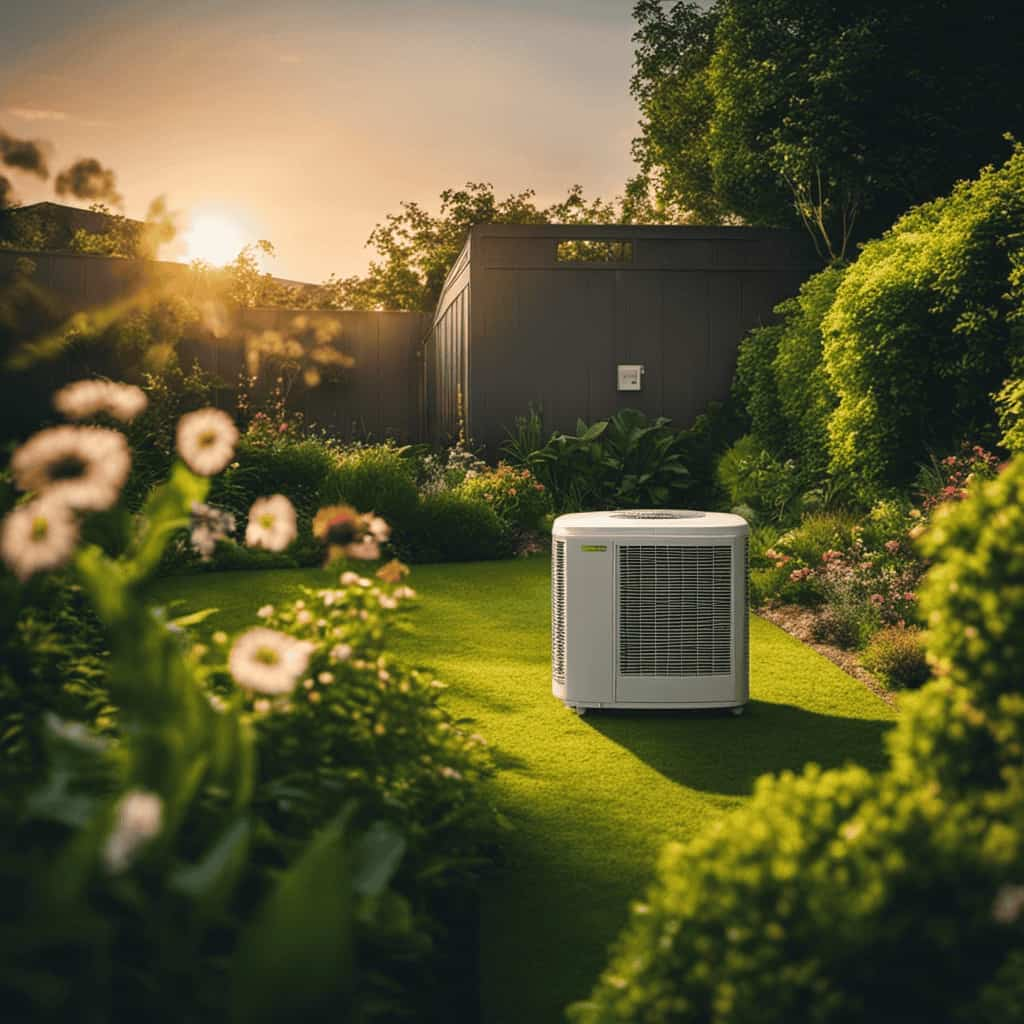
With advancements in smart thermostat technology and ongoing innovation, the future looks bright for energy efficient heat pump HVAC systems. So let’s harness the power of these systems and take our comfort and efficiency to new heights.









